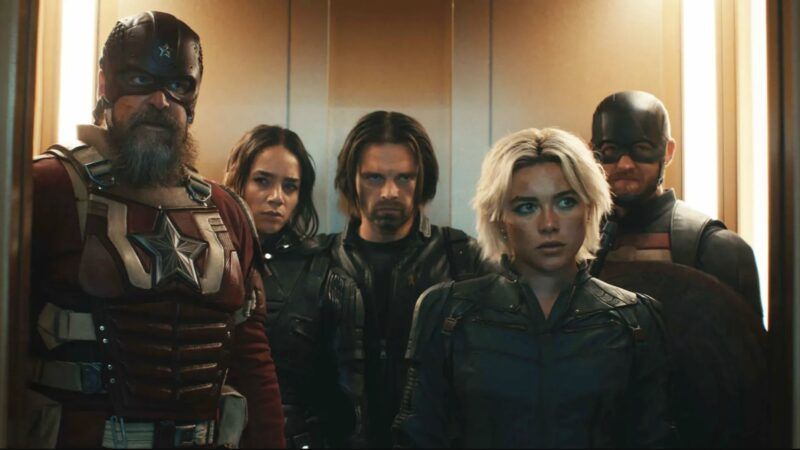Thunderbolts* Is a Therapy Session for the Marvel Movie Universe
The latest installment of the MCU is a movie about superhero has-beens fighting a depressive episode.

Thunderbolts*, the latest installment in the long-running, hugely successful Marvel Cinematic Universe (MCU), plays like a therapy session for a struggling franchise. This is mostly a good thing.
The movie opens with Yelena Belova, a former assassin trained in the same secret program as Black Widow, saying that she's bored. She's working yet another job that requires her to travel to some foreign land, infiltrate a lab, and take down a bunch of bad guys so that she can blah blah blah. Who even cares anymore? The whole routine has become tiresome.
Yelena's boredom is quite clearly intended as a reflection of the state of the MCU, which, after ruling over the box office for more than a decade, has been on unsteady footing since the pandemic. A handful of entries—Guardians of the Galaxy 3 and Shang-Chi and the Legend of the Ten Rings—have risen to the occasion, but too many of these comic book movies have felt dutiful and rote at best, and at times woefully misconceived, with rotten special effects and find-the-Easter-Egg plots incomprehensible to all but the most diehard MCU fanatics.
Yelena's boredom with her life and her missions is the franchise acknowledging that fans are bored with what it has to offer.
Yelena isn't the only one with a dark cloud hanging over her, either. Her father, Alexei, the former Soviet super soldier Red Guardian, has fallen on hard times, and lives in the shadow of his old glories. Then there's John Walker, who was briefly Captain America, and now works as a low-rent hero after his wife and child left.
As the movie proceeds, Yelena and Walker meet up at an abandoned storage facility in the desert, along with two other who-are-they-again? characters from MCU past: Taskmaster, the bow-slinging baddie from Black Widow, and Ghost, who appeared in an Ant-Man film. They're all there thanks to the shadowy involvement of CIA director Valentina Allegra de Fontaine, who is under Congressional investigation and who, it's safe to say, does not have our heroes' best interests at heart.
(February's Captain America: Brave New World featured a raging president who turned into the monstrous Red Hulk. Thunderbolts* gives viewers a scheming CIA director who tries to cover up her own disasters. If there's a recurring theme in this year's Marvel movies, it's that the federal government isn't your friend.)
The pileup of lesser characters means that, like so many Marvel movies, Thunderbolts* occasionally feels as if it should play with an on-screen Wikipedia entry, or at least a "previously on" recap, for those who haven't watched dozens of hours of MCU movies and TV series. The good news, however, is that in this case, the web of franchise connections is mostly irrelevant to the story.
That story revolves around de Fontaine's history with another character who turns up at the abandoned storage facility, a shaggy-haired guy named Bob. Bob doesn't remember much about who he is or how he got there, but he's wearing a hospital gown, and it's clear he's not entirely OK.
Bob, it turns out, is dealing with depression, a dark cloud of nihilism and sadness that makes him question his own value in the world. And when it inevitably turns out that there's more to his story than initially apparent, that depressive streak becomes everyone's very bad day, and the movie's reason for being.
Yes, Thunderbolts* is literally a superhero movie about has-beens fighting off depression. It's more than a little on the nose, given Marvel's trajectory. But what's welcome about it is the lack of pretension, the relatively minimal burden of franchise lore, and the general competence with which the requisite action and comedy beats are assembled.
The assembled gang of actors all play their third-tier super-losers with an enjoyable mix of grumbling and gusto. And Florence Pugh carries the film as the bored—but not quite ready to give up on life—Yelena. The dynamic is modestly charming in a way that MCU movies haven't been in a while.
Director Jake Schreier, meanwhile, handles the expected action set pieces with clarity and competence. And the third act—set in an absurdist, Charlie Kaufman-esque literalization of a depressive void—dodges some of the pitfalls that have plagued superhero movies for years. Unlike the recent Captain America: Brave New World, Thunderbolts* doesn't give the sense that it's been heavily edited and stitched together from disparate pieces and competing concepts.
It feels, well, like a real movie, more or less. It's coherent and cognizable without a college degree in superhero studies and (mostly) complete unto itself. It's a low bar to clear, but that's the standard post-pandemic Marvel has set for itself.
